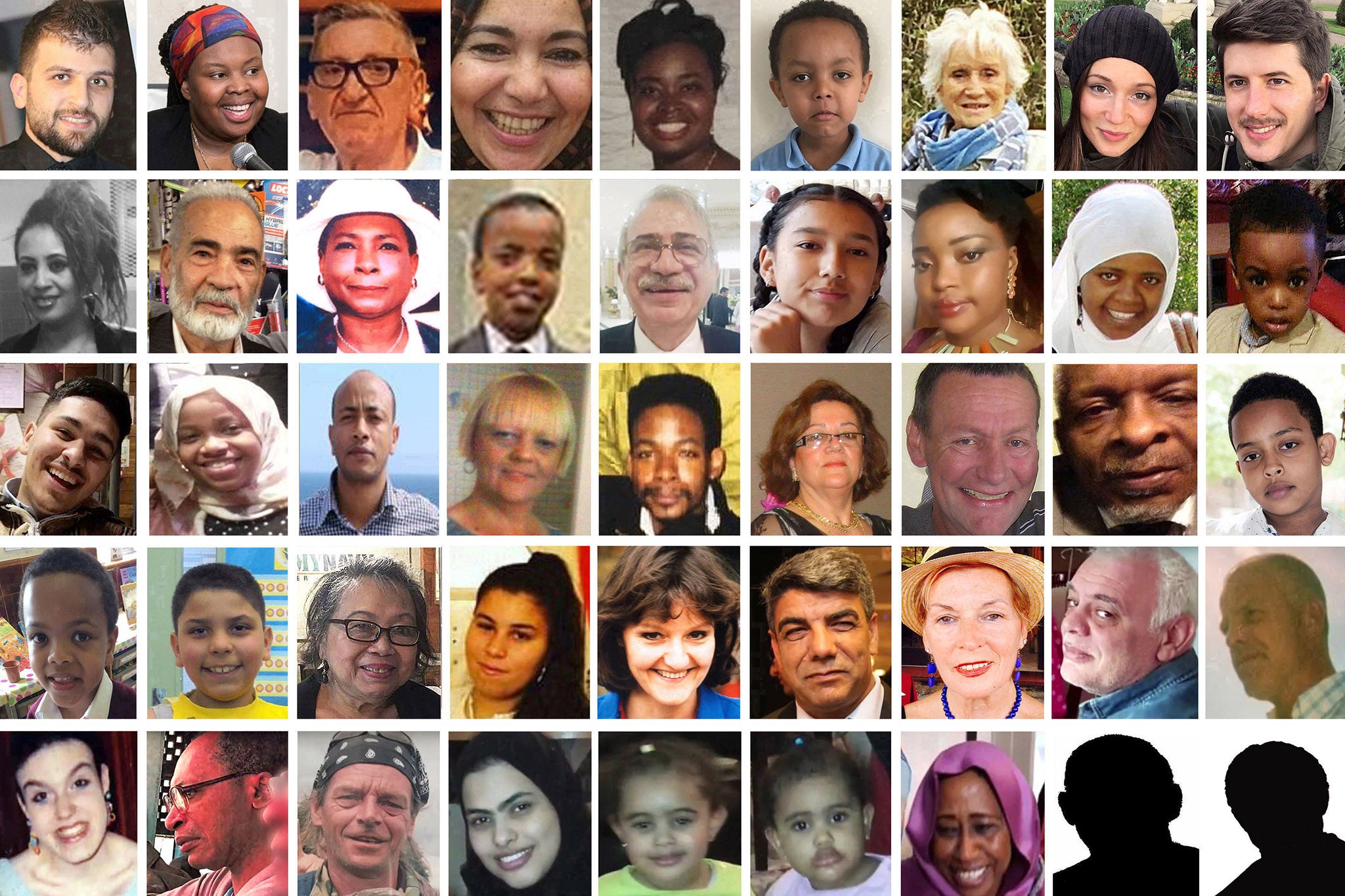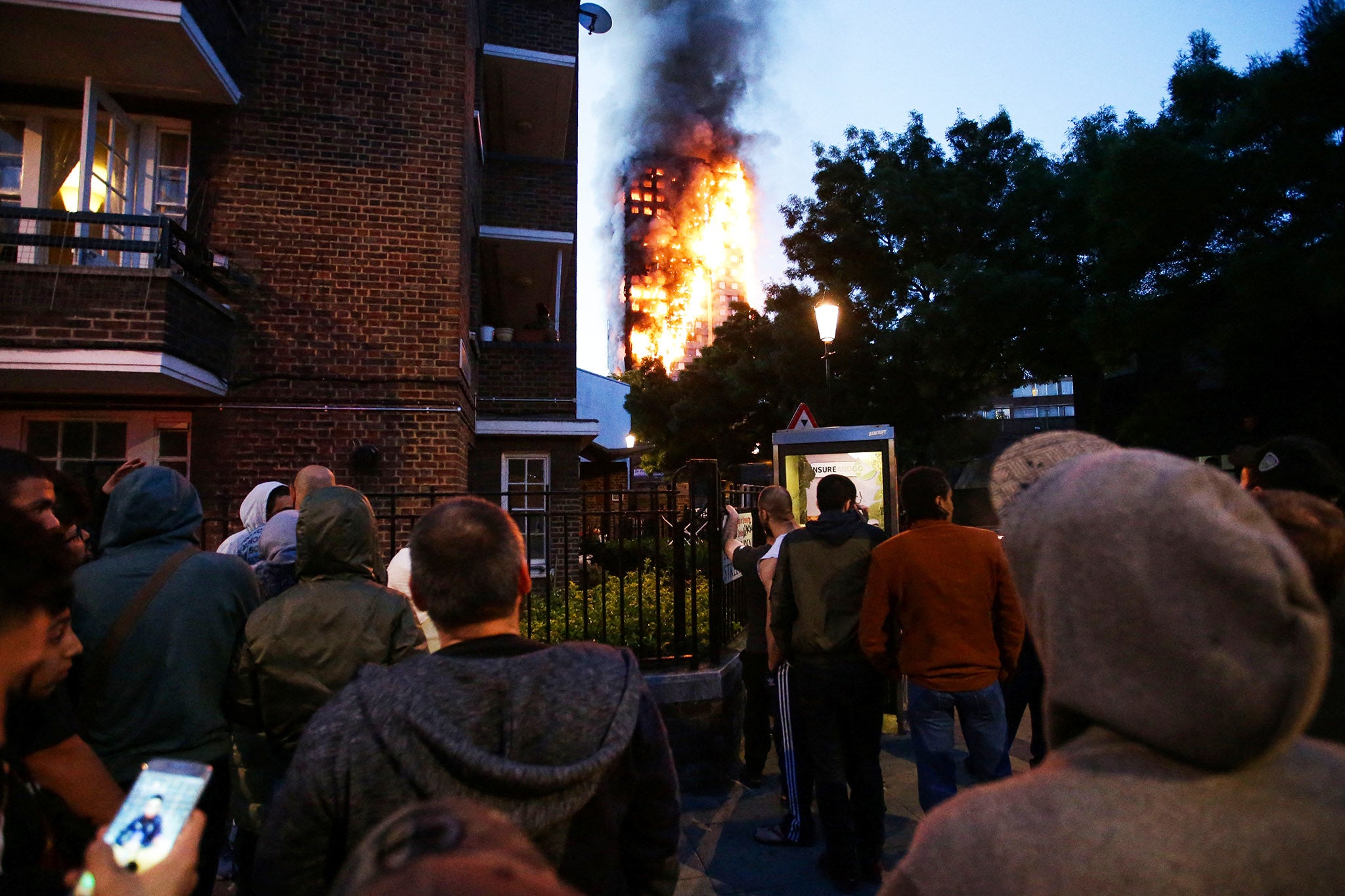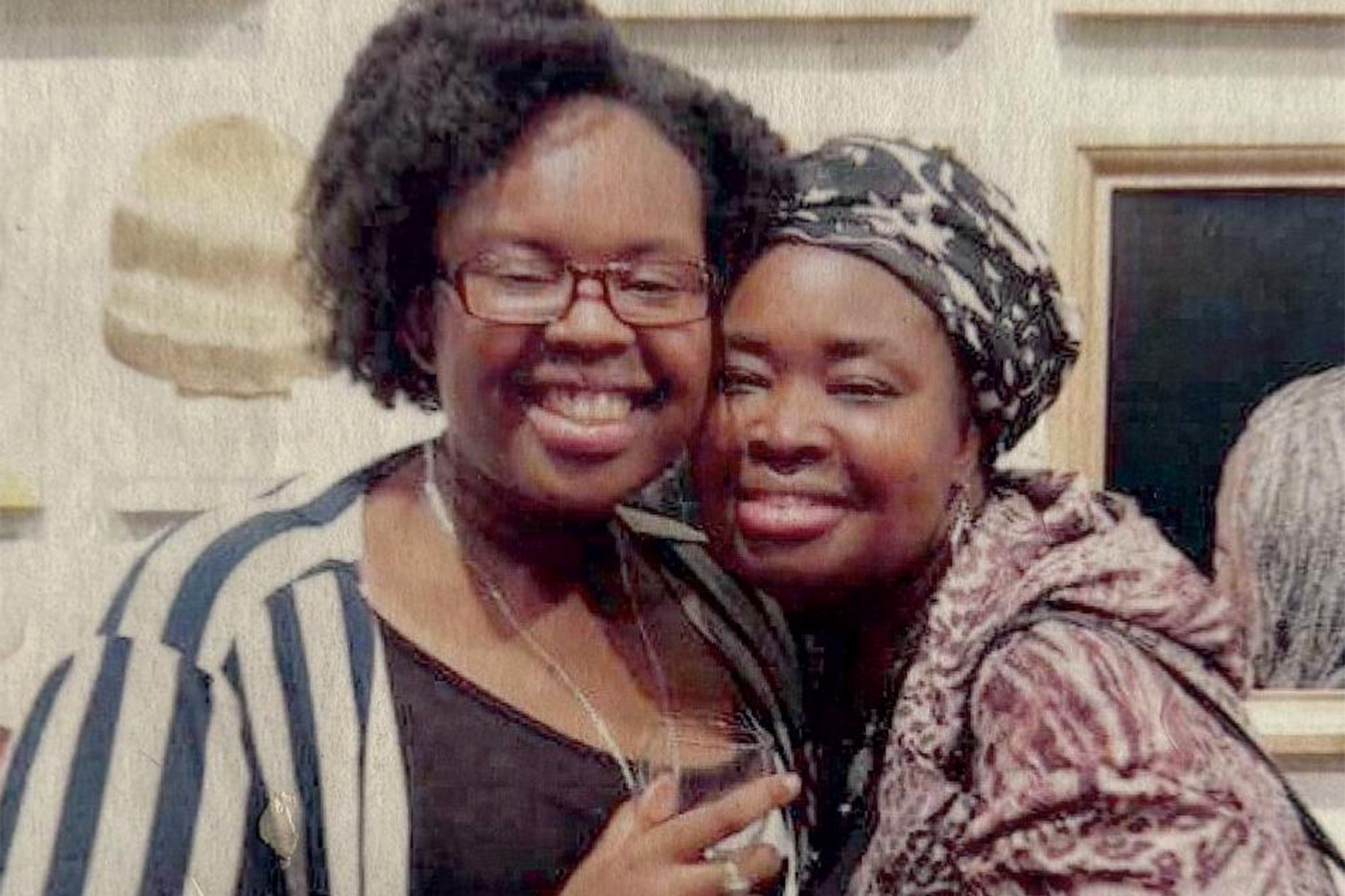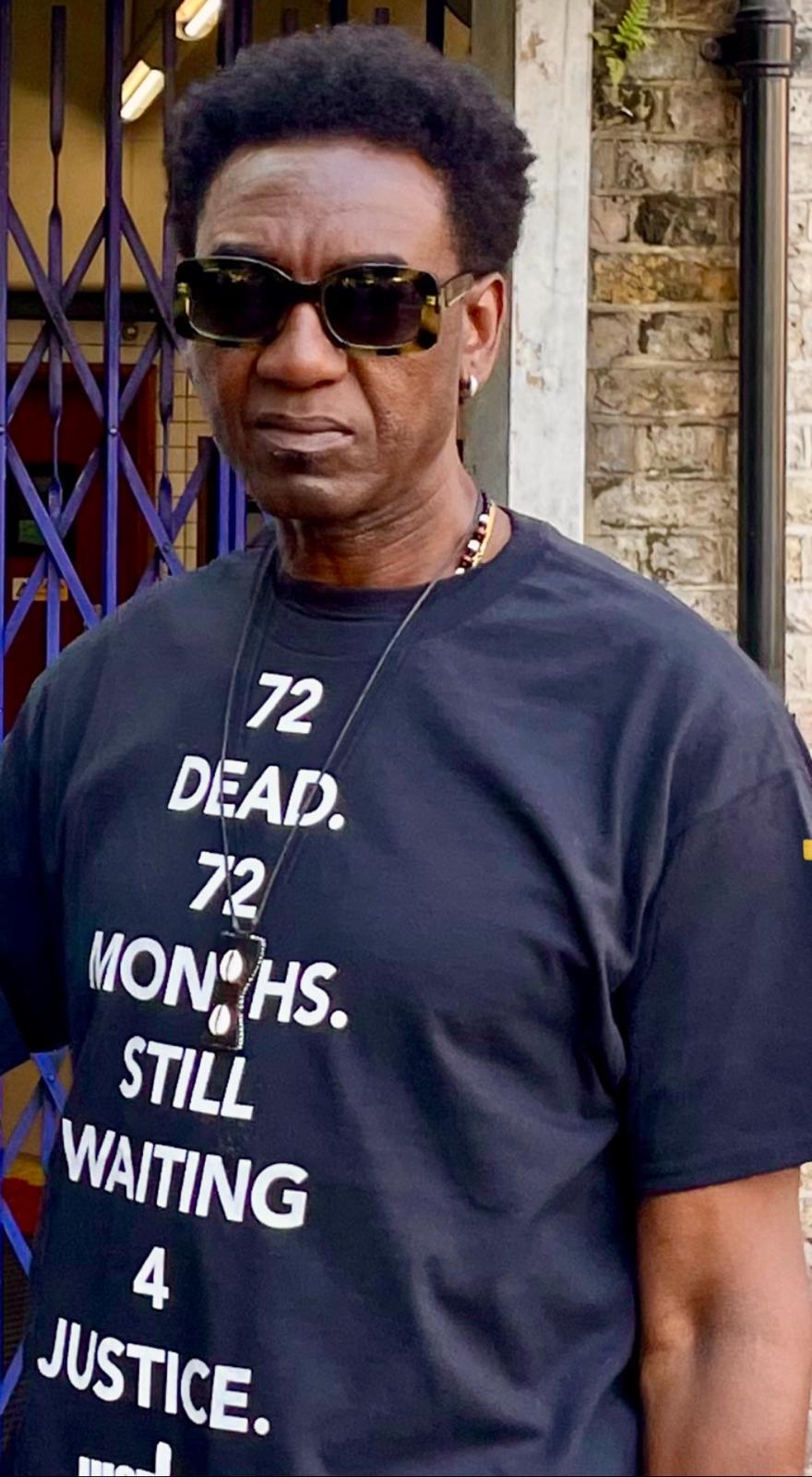Justice for Grenfell: ‘We are paying with our suffering, but the companies are still making a profit’
Failed by government, local councils and dishonest companies who viewed regulations to keep people safe as a ‘burden’ – the final report into the fire which resulted in the avoidable deaths of 72 residents is damning. So, why are cladding fires still happening and profits still being made? Zoë Beaty speaks to grieving relatives who feel their voices are still not being heard


On Tuesday, Damel Carayol took a long-awaited trip. Seven years after the Grenfell fire killed 72 and irrevocably changed the lives of hundreds more, and five years after the first inquiry report was delivered, Carayol picked up his copy of the final findings.
“I went with my niece,” he says. “She took out one of the volumes and the page immediately fell on the names of our two relatives. And this report is more than 1,000 pages long. But there they were: Mary Mendy, Khadija Saye. I said to her, they are around us. They’re helping to guide us through. Because they want justice as well.”
Carayol’s cousin, Khadija, 24, a talented artist who had been selected to exhibit her work at the Venice Biennale, and her Gambian mother Mary, were trapped on the 20th floor of the tower when the fire began just before 1am on 14 June 2017. At 1.49am, a terrified Khadija posted online asking friends and family to “pray for me and my mum”. They had tried to escape, but the smoke was “too strong”.
The report, published on Wednesday, is a landmark moment in the fight for justice for Khadija, Mary and the other 70 victims of the fire, who all have equally harrowing stories. One floor below, Marjorie and Ernie Vital, mother and son, were found fused as they clung to each other while flames engulfed them; four-year-old Fethia, known as “Fou-Fou”, lived in flat 203 and died alongside her mother and sister. Berkti, 29, and her son Biruk Haftom, 12, were found dead higher up in the building, after climbing up the tower to seek refuge. Berkti was 10 weeks pregnant at the time.
On Wednesday the 1,700-page document blamed “decades of failure” by successive governments and “systematic dishonesty” of the multi-million-pound companies, who provided cladding products and material, for each of their “avoidable” deaths. Sir Martin Moore-Bick, the chair of the inquiry, found that Arconic, Kingspan and Celotex “engaged in deliberate and sustained strategies to … mislead the market”.
Companies such as Saint-Gobain, who sold their majority share in Celotex, the company that made 95 per cent of the insulation on the tower, earlier this year, and Rydon, the main contractor for the works, are still gaining public contracts, according to The Guardian. Its report this week claimed that deals amounting to £250m “between councils, health authorities and housing associations and the companies that were involved in the disastrous refurbishment, as well as their subsidiaries” have been made over the last five years.
Only last year the Building Research Establishment (BRE) confirmed it would no longer work with Kingspan – an Irish company who, seven years after Grenfell, is still in operation with a turnover of around €8bn – or Celotex as a direct result of evidence uncovered by the inquiry.
Despite Kingspan’s insulation only making up 5 per cent of the total, Wednesday’s report found that “persistent dishonesty on the part of Kingspan in pursuit of commercial gain, coupled with a complete disregard for fire safety” on its K15 product, “created the conditions” for Celotex to move into the market.
Arconic – who produced the aluminium composite material (ACM) cladding found to be the “primary cause” of the fire and where one director drives an Aston Martin and “bought a €7.5m seafront mansion the year after the tragedy” – rejected any claim that its subsidiary AAP “sold an unsafe product”. However, the inquiry heard that Arconic sought to sell more flammable products to the UK when it was restricted in other countries. It made a pre-tax profit of $706m in 2022.
To the disgust of the families wanting answers, four employees of Arconic refused to give oral evidence to the inquiry. Others who bothered to attend continually passed the buck. Countless witnesses called shirked responsibility time and time again, answering, “I do not recall” or, “I do not remember” to basic, but pertinent, questions.
The same casual disregard for accountability was seen in internal emails, in which those involved in manufacturing and regulating the materials openly laughed at potentially deadly hazards.
One email between the contractors, fire engineers and architects about the need to install strong fire barriers, which was presented in phase one of the inquiry, says: “There is no point in ‘fire stopping’, as we all know, the ACM will be gone rather quickly in a fire!”
“This issue has been burning for a LONG time though, hasn’t it? (Get it!!!!) Why is it raising its head again all of a sudden,” reads another. The sickening email is from a senior staff member at Local Authority Building Control and refers to the wording of a certificate that wrongly asserted Kingspan’s insulation could be used on high-rise buildings.
An exchange between Kingspan employees about cladding which did not meet regulations sees one employee say flippantly: “All lies mate. All we do is lie in here.”
Kingspan, along with Arconic, who produced the “violently combustible” aluminium composite material (ACM) identified as the “primary cause” of the rapid fire, are still listed as members of the Aluminium Federation (Alfed), the “voice of the aluminium sector”.
In a statement on its website, Arconic said its subsidiary, Arconic Architectural Products SAS (AAP), “respects the inquiry process” and “will continue to engage with further legal processes”.

“Together with other parties, AAP has made financial contributions to settlements for those affected, as well as to the restorative justice fund,” it added.
Karim Mussilhy, a campaigner for Grenfell United, who lost his uncle, Hesham Rahman, in the fire, says the report “reads like a badly written horror film”. When Rahman got his top-floor flat in Grenfell Tower in 2013, he told Mussilhy that living so high made him feel “closer to God”.
He, along with the other grieving families, demands an end to a culture that protects corporations from being held accountable, and answers from the governments that allowed them to for so many years.
“I recently drove past a development, some flats, and one of the companies that was on the stand in the inquiry was doing the development,” Carayol says. “My blood just boiled; they’re still free with everything that’s come out. I know there hasn’t been a guilty charge as such. But it’s just such a kick in the stomach that they’re still there to make a profit, after all that’s happened.
“It can’t be just us, as the aggrieved, as the bereaved, paying the price. We’re paying with our suffering. Who else is going to be suffering from the decisions that these companies make?”
As the report sets out the facts, close attention is now being paid to when, how and if those involved will be held to account for the worst UK residential fire since the Blitz.
“For most of the survivors, definitely all of the bereaved, they see our justice system as applicable to all,” Yvette Williams MBE, a lead campaigner for Justice 4 Grenfell, said on Tuesday. “The rule of law is the foundation of any democracy – as long as it’s applied equally.
“If one of us had set fire to the tower, our case would be done and dusted, we’d be sitting in an overcrowded HMP. But you can hide behind corporatocracy. You can hide behind your political status. You can hide behind your civil service status, or your public office status. You can’t hide if you’re a member of the public. It’s almost a two-tier system.”
My blood just boiled; they’re still free with everything that’s come out. I know there hasn’t been a guilty charge as such. But it’s just such a kick in the stomach that they’re still there to make a profit, after all that’s happened
Williams says that the criminal investigation – which has been consistently delayed – should have been the priority before a public inquiry began. “Instead, we were told at a council meeting that the local authority was told to submit anything they deemed significant to the inquiry. Why weren’t their offices shut down and computers seized?”
Meanwhile, it was residents who were dismissed as “militant troublemakers”, Moore-Bick concluded today. More than 85 per cent of those who died in the fire were from ethnic minorities, while the majority were from working-class backgrounds – facts that drive right to the heart of the Grenfell disaster. Race and class are so inextricably linked with the tragedy that residents called for the inquiry to include a separate investigation into how the two elements contributed.
The overwhelming feeling yesterday was that corporate greed fed on deeply ingrained imbalances of power, with those whose voices are so routinely dismissed by governance and authorities paying the price. Prior complaints by residents were ignored. Regulations to keep people safe were deemed a “burden on the industry”. Those who died – and thousands more still at risk in unsafe housing – were not only neglected but actively discriminated against.
Systemic discrimination and stigma around social housing were underlying factors that drove political decisions that prioritised profit over people, campaign groups say. The phase two report found that government officials were “complacent, defensive and dismissive” about fire safety, ignoring mounting evidence of concerns.

Yet little action has been taken. Campaigners like Mussilhy have previously written to lobbying group Alfed – which states on its website that members have their voice heard “at the highest level of government” – to request that the two companies implicated in the fire be removed. Back in 2021, it responded that it would “await the outcome of the inquiry before taking any steps that may be required in relation to any of our members”. The Independent has yet to receive a response from Alfed on whether any action will now be taken.
“The corporations behaved like that because they knew that they could get away with it,” Mussilhy says. “But for me, the lobbying that happens – the relationships between these corporations and the government – we have to have more transparency.”
In a strongly-worded statement on Wednesday, Grenfell United accused the government of “aiding and abetting crooks and killers”, and called for Keir Starmer to “create something that doesn’t exist: a government with the power and ability to separate itself from the construction industry and corporate lobbying, putting people before profit.”
The 72 deaths at Grenfell were “all avoidable”, Moore-Bick said on Wednesday. But, despite everything that Grenfell and the subsequent inquiry have uncovered, there are still more than a million people potentially living in fire-risk flats, according to new data analysis from the i paper – significantly more than previously estimated, due to thousands of properties that are yet to be fully assessed being omitted from data.
And while a nationwide review calling for dangerous cladding to be removed or adapted to meet safety regulations, government estimates show there are still at least 172,000 dwellings in buildings wrapped in highly unsafe, similarly cheap, flammable cladding.

Many who own flats have been handed bills amounting to thousands of pounds and left unable to sell, insure or remortgage their homes until work is complete. Since Grenfell, there have been four more significant cladding fires, the most recent in Dagenham where 80 people had to be evacuated just last week.
The review was done to ensure a disaster like Grenfell never occurred again, but declaring that “lessons have been learnt” has increasingly fallen flat with campaigners listening to words with little action to back them up.
Wednesday’s inquiry – which began in 2017 and cost more than £200m – set out 58 recommendations, including expanding the definition of higher-risk buildings and calling on the government to bring together all the functions relating to fire safety under a single regulator.
It also recommended that fire safety strategies produced by a safety engineer become statutory, and for fire engineers to become formally recognised.
But all of this will be wasted time and money, says Williams, if the government doesn't take appropriate, definitive action.
“We spend all of this money and all of this time ‘learning’ – learning about how we can make people safe and how we can stop the corrupted corporations coming in and taking advantage of our regulations – and then running away when something bad happens again,” Williams says.
“There’s still no legal requirement for the government to implement any of the recommendations. You write these huge reports and make all these recommendations, but without action, it’s just a waste of public money.
“It just feels like the work is starting or we’re starting the fight all over again.”
The Met police said there would be no criminal proceedings in relation to the Grenfell Tower tragedy for at least 12-18 months. In the meantime, campaigners are clear about what they want.
“I want there to be some clear, hard words about how the government knew the dangers of flammable material, knew the dangers of these materials on high-rise buildings, and knew within government that there were some serious concerns,” Mussilhy says.
“Ultimately, I want to see – I don't want to hear – I want to see some real engagement from the government on how to make sure Grenfell never happens again. Because as we’ve always said: it's never been a matter of if. It has always been a matter of when another Grenfell happens.”





Join our commenting forum
Join thought-provoking conversations, follow other Independent readers and see their replies
Comments